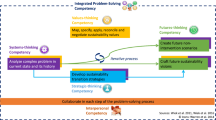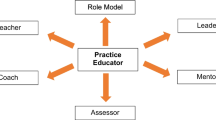Abstract
International health electives offer unique experiences for medical students to develop clinical skills and cultural competencies in unique and diverse environments. Medical students have been increasingly pursuing these learning opportunities despite the challenges. However, their goals in pursuing these opportunities and the relation between their learning objectives and actual experiences have not been studied adequately. It is important to assess these programs based on student objectives and whether those objectives are met. Thirty-seven medical students from five cohorts at a US medical school completed pre-post questionnaires regarding their global health elective objectives and learning experiences. The questionnaires included mostly open-ended questions and a Likert-scale rating of their overall experience. Qualitative thematic analysis involved inductive coding and followed a content-driven immersion-crystallization approach. Quantitative program evaluation measures yielded descriptive statistics. Five general objectives and four types of learning experiences were identified. Student objectives were: (1) to observe the practice and organization of health care in another country; (2) improve medical/surgical skills; (3) improve language skills; (4) learn about another culture; and (5) deepen knowledge of infectious diseases. All of their objectives were achieved. Moreover, one learning theme, “self-reflection and personal growth,” was not a student objective. Quantitative assessment showed that most students had a favorable elective experience. Program challenges were also identified. Students in a global health elective were able to fulfill self-identified learning objectives, while also gaining other unexpected yet important lessons. Students’ learning objectives also should be considered in evaluating learning experiences in international health electives.
Similar content being viewed by others
References
McKinley, D. W., Williams, S. R., Norcini, J. J., & Anderson, M. B. (2008). International exchange programs and U.S. medical schools. Academic Medicine, 83(10), S53–S57.
Drain, P. K., Primack, A., Hunt, D. D., Fawzi, W. W., Holmes, K. K., & Gardner, P. (2007). Global health in medical education: A call for more training and opportunities. Academic Medicine, 82(3), 226–230.
Bateman, C., Baker, T., Hoornenborg, E., & Ericsson, U. (2001). Bringing global issues to medical teaching. Lancet, 358, 1539–1542.
Edwards, R., Rowson, M., & Piachaud, J. (2001). Teaching international health issues to medical students. Medical Education, 35(8), 807–808.
Association of American Medical Colleges. (2010). 2010 Medical school graduation questionnaire all schools report. Washington, DC: Association of American Medical Colleges.
Association of American Medical Colleges. (1984). 1984 Medical school graduation questionnaire all schools report. Washington, DC: Association of American Medical Colleges.
Jeffrey, J., Dumont, R. A., Kim, G. Y., & Kuo, T. (2011). Effects of international health electives on medical student learning and career choice: Results of a systematic literature review. Family Medicine, 43(1), 21–28.
Haq, C., Rothenberg, D., Gjerde, C., et al. (2000). New world views: Preparing physicians in training for global health work. Family Medicine, 32(8), 566–572.
Smith, J. K., & Weaver, D. B. (2006). Capturing medical students’ idealism. Annals of Family Medicine, 4(1), S32–S37.
Bissonette, R., & Route, C. (1994). The educational effect of clinical rotations in nonindustrialized countries. Family Medicine, 26(4), 226–231.
Mutchnick, I. S., Moyer, C. A., & Stern, D. T. (2003). Expanding the boundaries of medical education: Evidence for cross-cultural exchanges. Academic Medicine, 78(10), S1–S5.
Chiller, T. M., De Mieri, P., & Cohen, I. (1995). International health training. The Tulane experience. Infectious Disease Clinics of North America, 9(2), 439–443.
Thompson, M., Huntington, M., Hunt, D., Pinsky, L., & Brodie, J. (2003). Educational effects of international health electives on U.S. and Canadian medical students and residents: A literature review. Academic Medicine, 78(3), 342–347.
Padgett, D. K. (2008). Qualitative methods in social work research. Thousand Oaks, CA: Sage Publications.
Borkan, J. (1999). Doing qualitative research (pp. 179–194). Thousand Oaks, CA: Sage Publications.
Thomas, D. R. (2006). A general inductive approach for analyzing qualitative evaluation data. American Journal of Evaluation, 27(2), 237–246.
Kuzel, A. J., & Like, R. C. (1991). Primary care research: Traditional and innovative approaches (pp. 138–158). Newbury Park CA: Sage Publications.
Mazur, L., & Sechler, S. (1997). Global interdependence and the need for social stewardship. New York: Rockefeller Brothers Fund.
Godkin, M., & Savageau, J. (2001). The effect of a global multiculturalism track on cultural competence of preclinical medical students. Family Medicine, 33(3), 178–186.
Houpt, E. R., Pearson, R. D., & Hall, T. L. (2007). Three domains of competency in global health education for all medical students. Academic Medicine, 82(3), 222–225.
Godkin, M., & Savageau, J. (2003). The effect of medical students’ international experiences on attitudes toward serving underserved multicultural populations. Family Medicine, 35(3), 273–278.
Ramsey, A. H., Haq, C., Gjerde, C., & Rothenberg, D. (2004). Career influence of an international health experience during medical school. Family Medicine, 36(6), 412–416.
Vora, N., Chang, M., Pandya, H., Hasham, A., & Lazarus, C. (2010). A student-initiated and student-facilitated international health elective for preclinical medical students. Medical Education Online, 15, 4896. doi:10.3402/meo.v15i0.4896.
Imperato, P. J. (2004). A third world international health elective for U.S. medical students: The 25-year experience of the State University of New York, Downstate Medical Center. Journal of Community Health, 29(5), 337–373.
Acknowledgments
This study was supported in part by grant 1 D56 HP00171-02 from the Health Resources and Services Administration (Washington, DC) to Dr. Koyfman. The authors would like to thank Dr. Kim Griswold, Dr. Richard Pretorius, Dr. Ray Bissonette, and Mr. Andrew Danzo for their assistance in reviewing this article and Ms. Karen Devlin for her assistance in the preparation of the manuscript.
Author information
Authors and Affiliations
Corresponding author
Rights and permissions
About this article
Cite this article
Holmes, D., Zayas, L.E. & Koyfman, A. Student Objectives and Learning Experiences in a Global Health Elective. J Community Health 37, 927–934 (2012). https://doi.org/10.1007/s10900-012-9547-y
Published:
Issue Date:
DOI: https://doi.org/10.1007/s10900-012-9547-y




